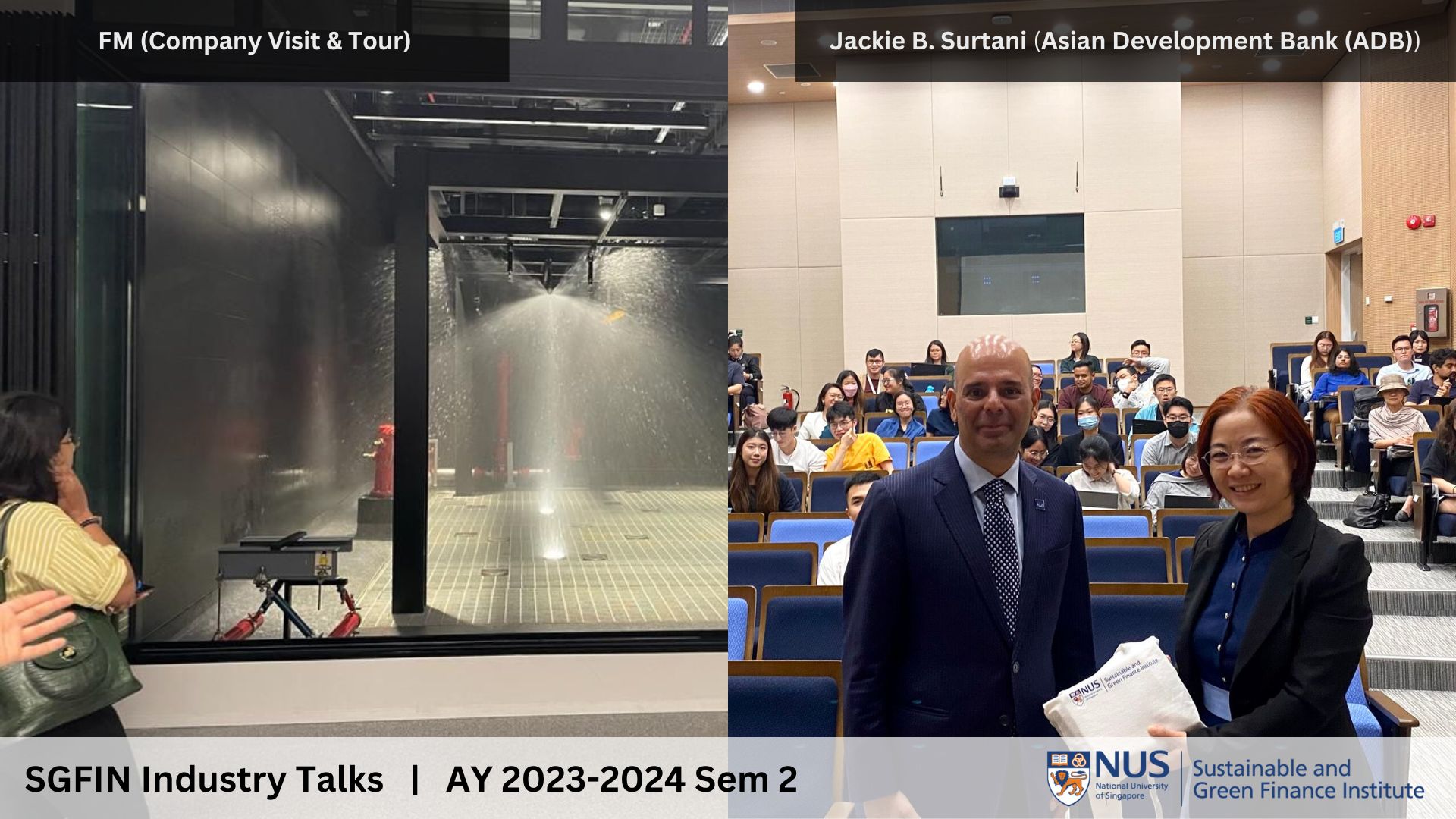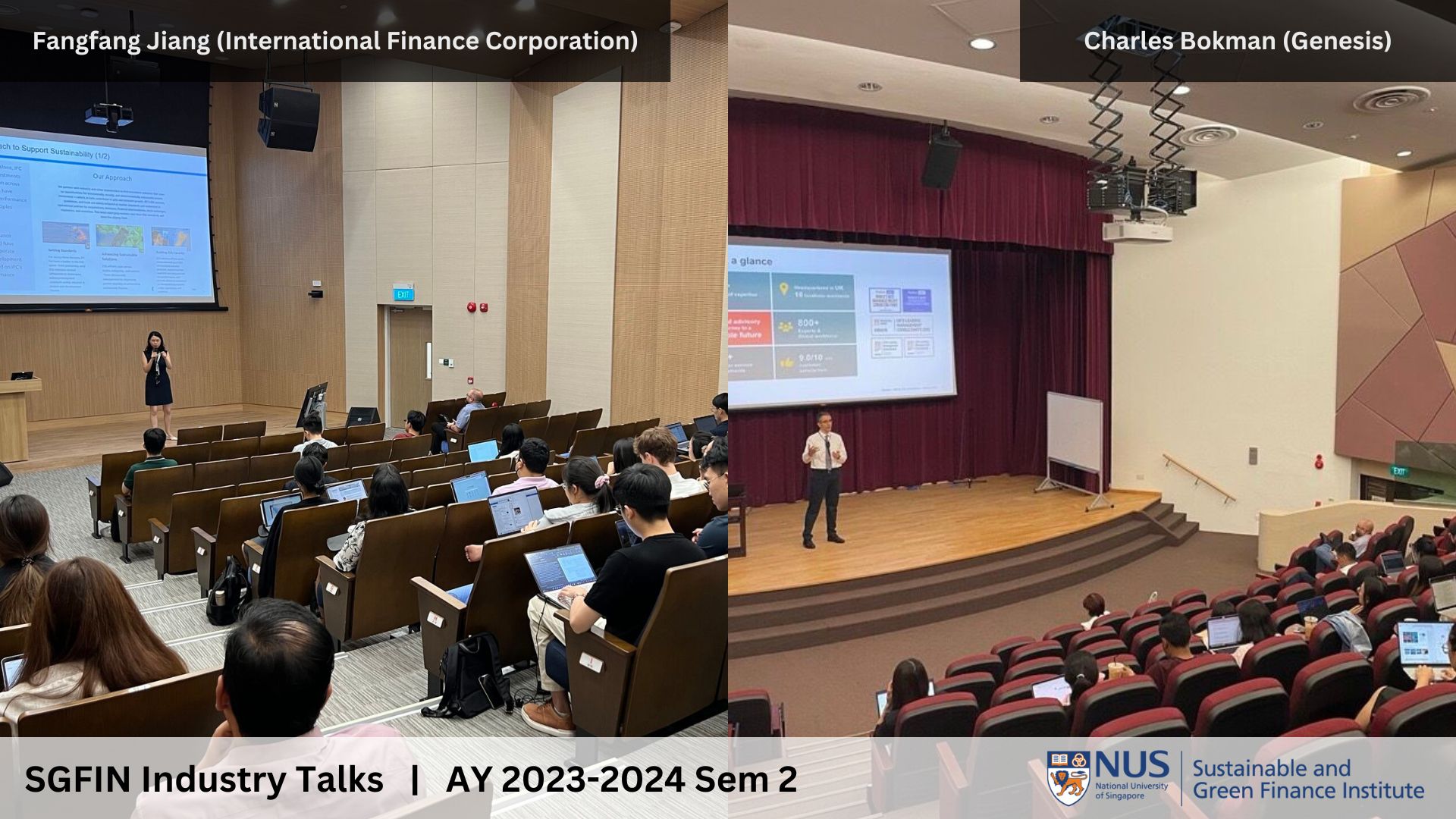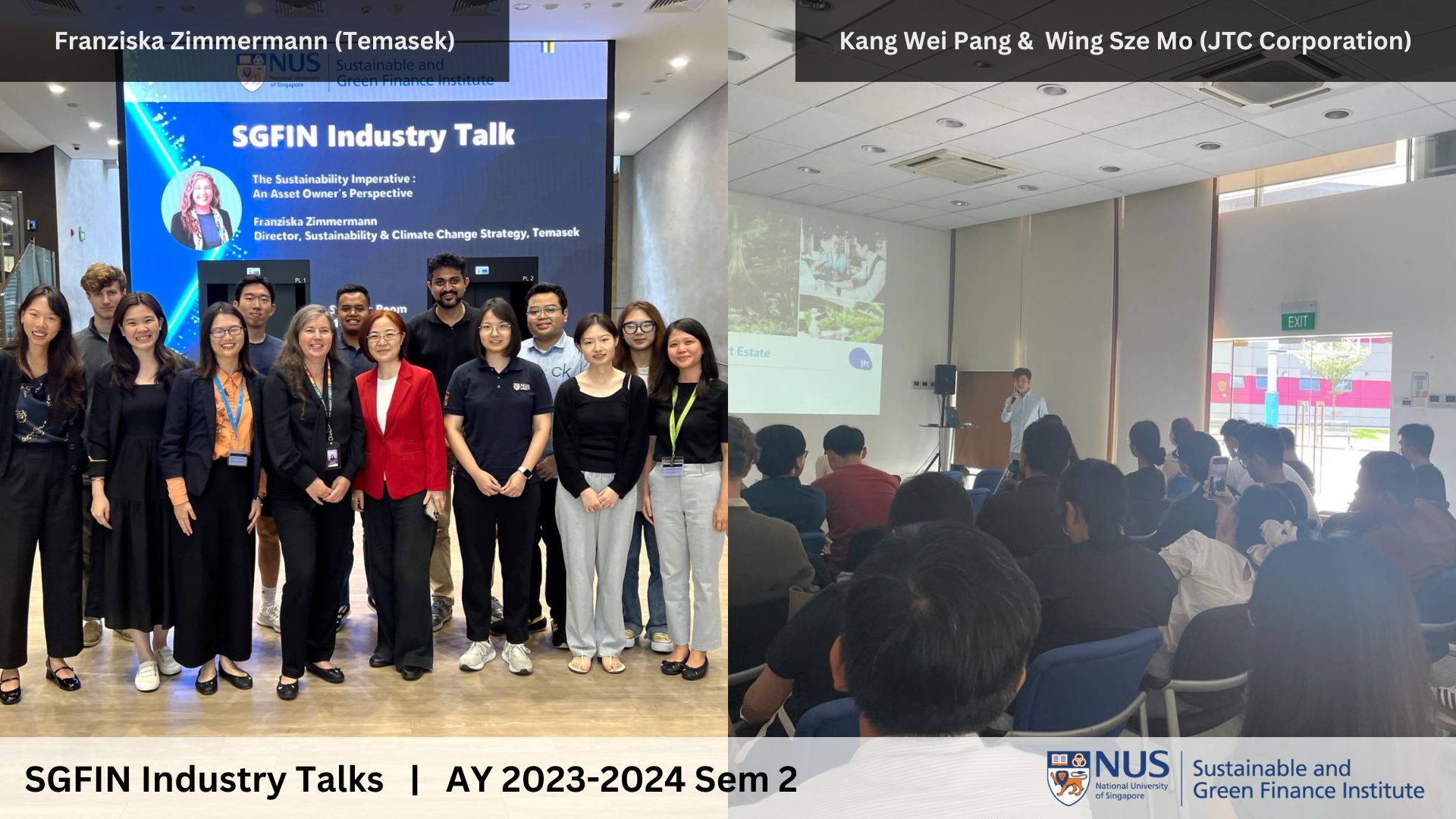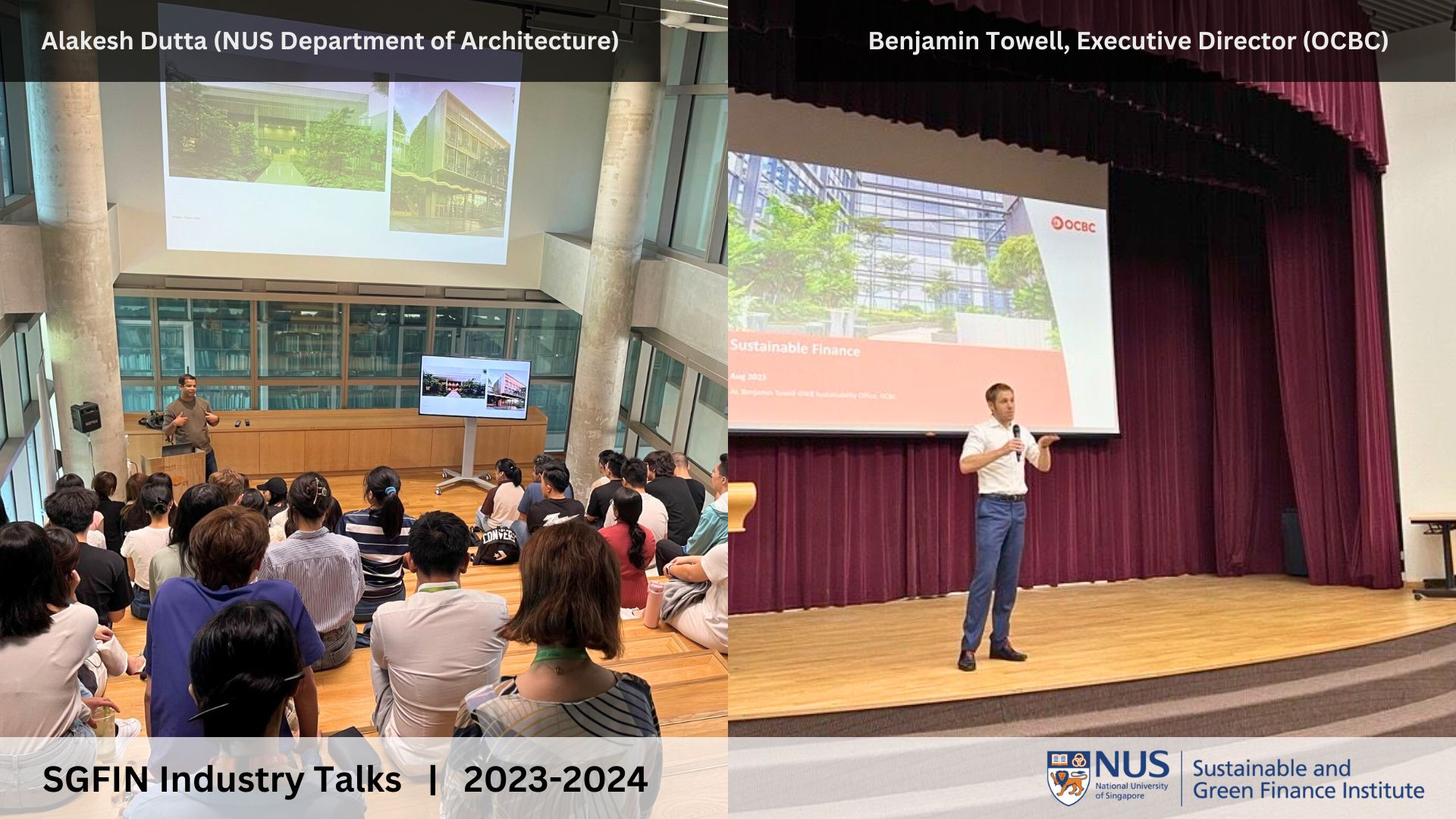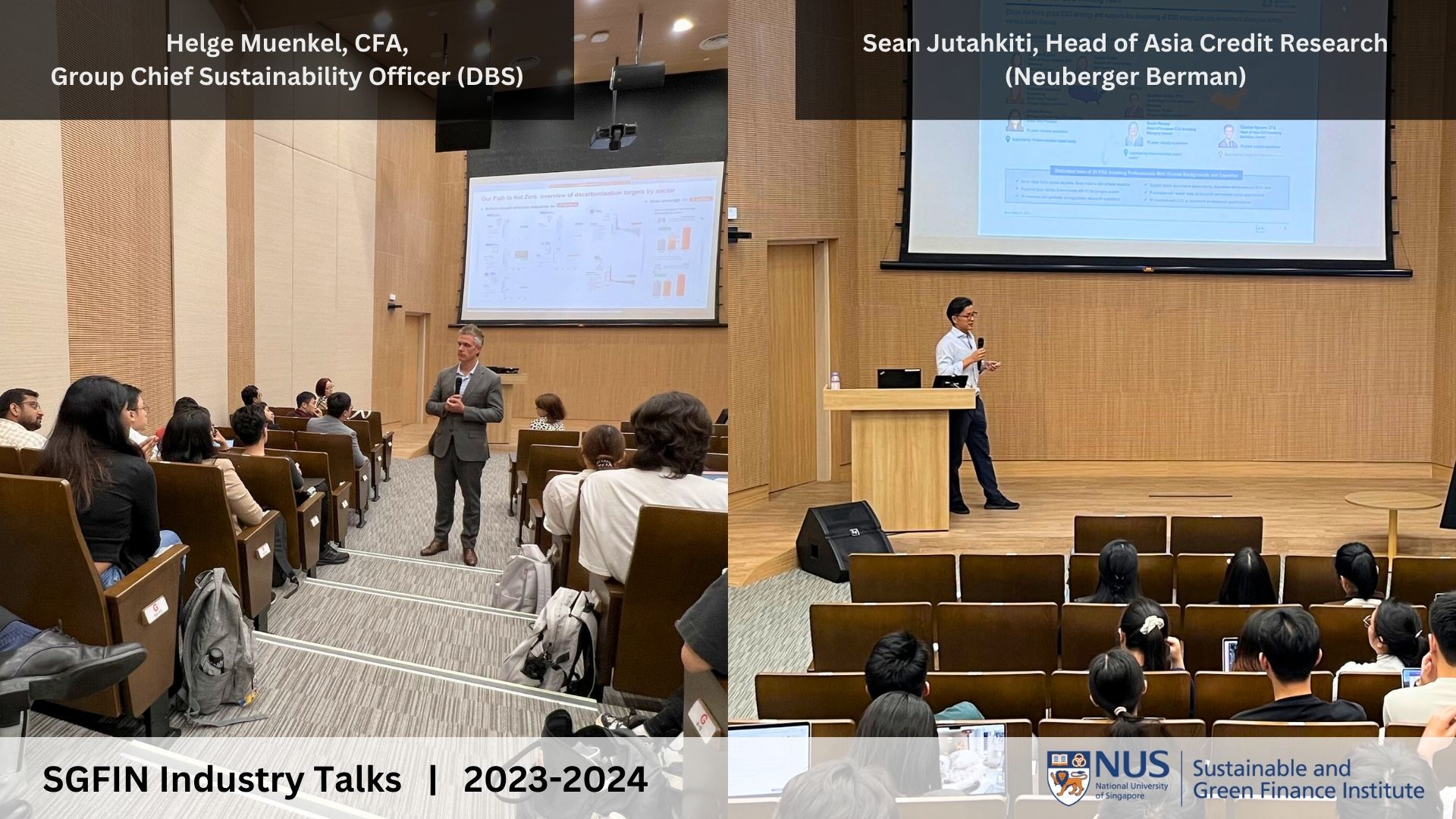Semester 2, AY 2023-2024
Here is an incredible journey we at SGFIN had with our stakeholders in nurturing a younger generation of sustainable finance professionals through the industry talks in Semester II of the Academic Year 2023-2024!
In line with our strategy of enabling immersive industry experiences for our NUS MSC SGF students and SGFIN researchers, we continued to invite sustainable finance experts to share about the key challenges they were working through, as well as the talent gap and career opportunities they observed in the local and regional markets.
We opened the semester with an engaging guided tour of the FM experiential risk management facility and simulation labs in Singapore. As climate change is accelerating the frequency and intensity of extreme events, firm level resilience to physical risks becomes increasingly important. During the tour, our students learned from the FM team about the company’s hazard assessment methodology covering construction, occupational and environmental/landscape exposure. These insights helped our students understand the considerations that would increasingly need to inform decisions on asset protection measures, location strategy and supply chain optimization, to enhance business resilience in a context of climate risk combined with growth and infrastructure challenges in our region.
We were then honored to host Jackie B. Surtani, the Regional Director and Head of the Asian Development Bank (ADB)’s Singapore Office, to share with our students his view on the evolving role of multilateral development banks in Asia. Jackie introduced to our students and researchers ADB's aim of helping developing countries in Asia Pacific to grow socially and economically, along with the “One-ADB" integrated approach promoting blended financing, expertise sharing, and collaboration between public and private sectors. It was a fantastic opportunity to learn about the unique challenges ADB faced across Asia Pacific countries, and how the successful execution of multiple important infrastructure and energy transition projects was achieved in the region.
We were excited to continue our journey into the development finance world with Fangfang Jiang, Regional Lead for Digital Financial Services at the Financial Institution Group Asia & Pacific in the IFC - International Finance Corporation. The discussion delved into several aspects of IFC's commitment to sustainability. As a leading development financial institution operating in over 100 countries, IFC adheres to Environmental, Social, and Governance (ESG) standards, ensuring a clear alignment with their investments across different industry sectors. Our students learned about the catalytic role IFC plays in sustainable finance projects investments - such as green bonds/loans and sustainability-linked bonds/loans, many of which being the first of their kinds in the respective home countries. It was very insightful for our students to hear about IFC’s collaborations with regulators and industry associations, and the way it contributes to the standard setting, market creation and capacity building for financial institutions in emerging markets.
Next, we had the pleasure of hosting Charles Bokman, Head of Country at Genesis Singapore. Genesis is a market-leading advisory company providing technical and consultancy services to the global energy industry, providing advisory services to help clients make informed decisions pertaining to decarbonization, which facilitates the clients' journey to achieving net zero and the path forward to sustainable global energy. Charles highlighted the importance of Carbon Capture, Utilization and Storage (CCUS) in achieving deep decarbonization in large industrial sectors. Our students and researchers learned about the outlook of CCUS in the coming year, with notable trends including the increase in investment into CCUS technologies as their potential in lowering emissions and tackling climate change is being acknowledged. It was also very insightful to learn about the increase in CO2 utilization levels for commercial purposes such as Enhanced Oil Recovery (EOR), the emergence of CCUS solutions for hard-to-abate industrial sectors seeking to lower emissions, like Petro-chemicals, cement and steel, as well as advancements in carbon capture technology allowing for more efficient and cost-effective methods. Elaborate case studies were shared with our students, focused on green hydrogen and sustainable fuels, which shed light on the complex process of securing project financing.
Continuing the series, we were pleased to have Franziska Zimmermann, Director of Sustainability and Climate Change Strategy at Temasek, shared with our students her insights on the sustainability imperative from the asset owners’ perspective, elaborating how Temasek defined and evolved its investment strategies to enable positive environmental and social outcomes. Our students learned how Temasek undertakes in-depth ESG analysis that complements the traditional fundamental risk-return analysis for each investment opportunity, evaluating the impact of various climate change scenarios on the overall portfolio’s long-term expected returns and monitors ESG related risks across the portfolio. To advance and scale sustainable investment, Temasek has forged various partnerships across the financial industry and other sectors. It was very insightful for our students to understand how Temasek, as a thought leader and an enabler, invests in building an ecosystem of stakeholders from across industries and provides platforms to showcase solutions and catalyse joint action.
We were happy to conclude the semester with another immersive experience during our JTC Corporation company visit, where our students were hosted by Kang Wei Pang, Senior Project Manager of Punggol Digital District, and Wing Sze Mo, Deputy Director of New Estate Division 2, who shared the exciting efforts by JTC in building sustainable and smart industrial estates and our MSGF students had a ground visit to JTC's one-north for the informative presentation. Mr Kang introduced our students to how JTC has adopted a whole-life-cycle approach to imbue sustainability into the entire spectrum of its business value chain with the case study of the upcoming Punggol Digital District, which will be Singapore's first sustainable and smart business district with an Open Digital Platform (ODP) to provide a smarter and more sustainable way to work, live, play and learn.
We thus concluded a fantastic year of industry engagement and enriching experiences for our MSc SGF students and SGFIN researchers, who had the opportunity to hear from industry leaders on state of the art sustainable and green finance applications in real life business scenarios. We look forward to continuing our close partnership with industry leaders within Singapore, Asia Pacific and beyond, while we welcome our next batch of MSc SGF students for the Academic Year 2024-2025.
Semester 1, AY 2023-2024
What an exciting journey we had in Semester I of the Academic Year 2023 – 2024! SGFIN is proud to have continued the Industry Talks series, where thought leaders discussed their unique insights on sustainability and green finance with our Research Team and the new batch of MSc SGF students.
We opened this Semester’s series by welcoming back Ms. Herry Cho, MD and Group Head of Sustainability & Sustainable Finance at SGX Group (Singapore Exchange), who talked about the role SGX Group takes in supporting the green and sustainable finance ecosystem as a company, business and regulator. Our students were introduced to the exciting work SGX is doing with MSCI on Climate Action Indexes, and the latest trends and developments in sustainability reporting for both listed and private companies in Singapore. They also learned about the approach SGX is taking to help investors allocate capital towards portfolios with material emission reduction efforts, and the ways in which SGX is enhancing its own suite of sustainability products by launching innovative commodity derivatives such as the EF metal futures.
This session set the stage to further think about industry-specific challenges and opportunities, beginning with the built environment. An insightful case study was our very own SDE4 building in the NUS Campus - a sustainable building which is now net positive energy, due to its extensive use of photovoltaic panels and energy-efficient design. Alakesh Dutta from the NUS Department of Architecture offered insights on the hybrid ventilation systems and other optimizations that can be done to keep within both cost and energy budgets, such as studying the microclimate and harnessing the prevailing wind flows. Bringing together diverse skillsets and expertise into the team has emerged as crucial to the success of such high-performance projects.
Shifting the angle to the banking industry, Ar. Benjamin Towell, Executive Director at OCBC, walked our students through the significant role financial institutions play in aligning capital flows with the mitigation and adaption efforts their clients were undertaking, with a key focus on how finance can facilitate moving economic activities towards a “greener” state. Our students learned about OCBC’s coordinated approach in supporting the transition of SMEs, in addition to large corporate clients, as well as the bank’s decarbonization efforts specifically for the real estate portfolio. Benjamin also shared his view on 1.5C Net Zero pathways, limitations of tools such as CRREM, and real applications of decarbonization strategies.
Next, we delved into the approach that private investment funds are taking to ESG considerations, as Mr. Sean Jutahkiti, Head of Asia Credit Research at Neuberger Berman, introduced our audience to Neuberger Berman’s commitment to ESG investing across major asset classes. Mr. Jutahkiti highlighted the importance of incorporating sustainability considerations in investment decisions, with a critical focus on material ESG factors. His sharing has enriched the students’ understanding of sustainable finance, emphasizing the collaborative effort needed to move the industry forward and build a more responsible financial landscape.
To explore the space of financial intelligence solutions, we hosted Rohini Samtani, Business Development Manager (Climate Risk) at S&P Global, and Suresh Sivanandam, Sales Director (Energy Transition) at S&P Global Platts. Rohini’s presentation showcased the common challenges associated with conducting climate risk assessments, and explained how S&P Global has been assisting banks and other clients in modelling the financial impact of climate shocks on their portfolios. She showed the variations in physical risk exposure across different geographic locations, and introduced the S&P methodology for assessing transition risks. This included the company-level earnings exposure to different carbon costing scenarios, the prospect of individual firms’ alignment with the 2-degree goal of the Paris Agreement, and the progress on their Net Zero Commitments. Suresh’s talk focused on the significance of carbon pricing in the pursuit of net-zero targets. He provided an overview of the rising global adoption of compliance carbon pricing, the mechanics of voluntary carbon markets, and S&P Global’ s role in standardizing carbon emissions data, which enables meaningful assessments of firms’ environmental performance.
Later on in the semester, Mr Helge Muenkel, CFA, Group Chief Sustainability Officer at DBS Bank, introduced the sustainability landscape at DBS, including the banks’ overarching sustainability strategy and goals, and the practical challenges in the complex sustainability ecosystem. The presentation was followed by a highly engaging discussion with the audience around the phasing out of coal power plants and the complexity of balancing different interests from various stakeholders such as lenders, borrowers, and different types of clean energy suppliers.
As a result of the Industry Talks series, our MSc SGF students and SGFIN researchers have deepened their understanding of the key sustainability challenges in the financial sector – and we look forward to continuing our series in the new semester next year.
AY 2022 - 2023
From banking to consultancy sectors, SGFIN hosted senior sustainability leaders who shared insightful presentations on a range of sustainability and green finance topics and engaged in meaningful discussions with the inaugural batch of students from the MSc SGF programme.
The industry talk series in the first semester began with Ms. Herry Cho, Head of Sustainability and Sustainable Finance at Singapore Exchange, who highlighted the economic and financial implications of sustainability reporting and climate risk management, followed by Mr. Zubin Dabu, Chair of Bank of Singapore (BOS) Sustainability Forum and Mr. Sylvain Richer de Forges, Director of Sustainability at BOS, who provided an overview of BOS’s sustainability approach and the latest sustainability megatrends shaping southeast Asia’s developments.
Next, Ms. Genevieve Soh, Head of Platforms & Ecosystems at Climate Impact X (CIX), was invited to share about how CIX helps businesses to navigate and discover the world of carbon credits and Ms. Esther An, Chief Sustainability Officer of City Development Limited (CDL), emphasised the need for businesses to transition sustainably and work towards a common goal of net-zero at the national and international fronts. Mr. Eric Lim, Chief Sustainability Officer at UOB, explored the key challenges and opportunities for the finance sector in transforming into a greener economy, whereas Mr. Cedric Rimaud, Corporate Bonds and Green Finance Specialist at Climate Bonds Initiative (CBI), introduced various fixed-income instruments in sustainability. Mr. Ashwin Balasubramanian, Associate Partner at McKinsey & Company, ended the industry talk series for the first semester and discussed how Environmental, Social, and Governance (ESG) is a multi-phase journey in November 2022.
Starting of the industry talk series in the second semester, Ms. Priyaka N Dhingra, Associate Director, ESG (Sustainable Finance) at KPMG, shared various sustainable finance frameworks and interesting statistics on carbon emissions. Next, Ms. Lin-Net Koh, Director of the Centre for Impact Investing and Practices (CIIP), presented on the impact investing landscape in Singapore and Asia and Mr. Helge Muenkel, DBS Chief Sustainability Officer, shared on DBS’s sustainability journey and their net-zero pathways. Ms. Bee Lay Tan, Chief Sustainability Officer of SDAX Exchange, shared valuable insights on sustainable investing that SDAX is facilitating and Mr. Benjamin Soh, Managing Director of STACS, discussed the exciting development and growth of ESGpedia - an all-in-one platform to bridge the gaps in ESG-related data collection and reporting. Last but not least, Ms. Rehmat Johal, Sustainable and Transition Solutions Strategist of BlackRock, ended the industry talk series in the second semester with her sharing on BlackRock’s sustainability and transition investing.
As a result of the whole year’s industry talk series by these senior leaders, our MSGF students and researchers at SGFIN have benefited tremendously from the shared insights and discussions. We look forward to a continuing close collaboration with the industry to nurture new talents for the emerging sustainable and green finance sectors.

